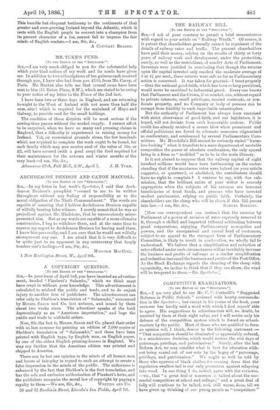THE RAILWAY BILL.
[TO THE EDITOR OF THE "SPECTATOR.']
SIR,—I ask of your courtesy to permit a brief remonstrance with regard to your article on "Railway Wrath." Of course, it is patent that shareholders generally cannot be cognisant of the details of railway rates and traffic. The present shareholders have paid their money, relying on the results of thirty or forty years of railway work and development, under the protection, surely, as well as the restrictions, of sundry Acts of Parliament. Investors were justified in concluding that though the returns upon the capital invested only reached the moderate average of 4 or 44 per cent., these returns were safe as far as Parliamentary action is concerned. It was taken for granted—I trust properly —that the national good-faith, which has been so long persistent, would never be sacrificed to influential greed. Everyone knows that Parliament and the Crown, if so minded, can, without regard to private interests, recall privileges, rescind contracts, or con- fiscate property, and no Company or body of persons can be exempt from liability to such improbable catastrophes.
But the authority of Parliament has always been exercised with strict observance of good-faith, and our legislators, it is hoped, will not deviate from such honourable custom. Public credit has already received a severe blow when prominent and official politicians are found to advocate measures stigmatised as confiscatory, and condemned by several Parliamentary Com- mittees. Mr. liundella's Bill cannot be seriously styled " harm- less-looking" when it transfers to a mere department of unstable composition the power of absolute confiscation, the only appeal being in a form so " modified " as to be in the main illusory.
Is it not absurd to suppose that the railway capital of eight hundred millions would have been forthcoming on the under- standing that if the maximum rates were halved (as your article suggests), or quartered, or abolished, the contributors should have no right to complain ? I venture to say, with due sub- mission, that the brilliant satire of your writer is scarcely appropriate when the subjects of his sarcasm are innocent beneficiaries of trust funds, and persons who have invested modest patrimonies, relying on public faith. Certainly, the shareholders are the sheep who will be shorn if this Bill passes
[How our correspondent can contend that the exercise by Parliament of a power of revision of rates expressly reserved to it, through a skilled and impartial tribunal arbitrating between great corporations, enjoying Parliamentary monopolies and powers, and the unorganised and casual herd of customers, subject to an appeal to the strongest form of Parliamentary Committee, is likely to result in confiscation, we wholly fail to understand. We believe that a simplification and reduction of rates effected under such circumstances will as inevitably increase the business and profits of railways as a similar simplification and redaction increased the business and profits of the Post Office. As the Stock Exchange regards the shearing of the sheep with equanimity, we incline to think that if they are shorn, the wind will be tempered to them.—En. Spectator.]


































 Previous page
Previous page